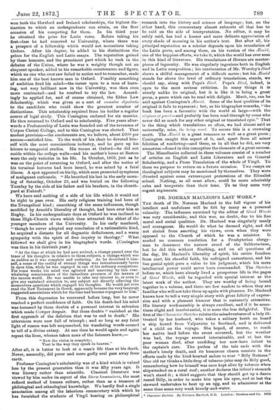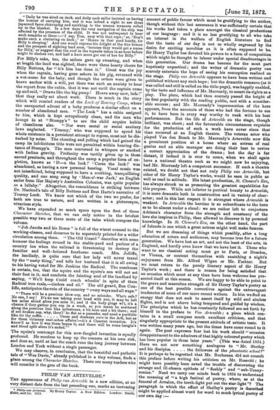DR. NORMAN MACLEOD'S LAST WORK.*
TILE death of Dr. Norman Macleod in the full vigour of his intellect and usefulness will be felt by many as a personal calamity. The influence exercised by the editor of Good Words was very considerable, and this was, no doubt, due to his fine moral and social qualities. Dr. Macleod was singularly manly and courageous. He would do what he deemed right, and did not shrink from asserting his views, even when they were opposed to the Church of which he was a minister. It needed no common resolution for a Presbyterian clergy- man to denounce the narrow creed of the Sabbatarians, but he did this without flinching, and on all questions of the day, Dr. Macleod's liberality of spirit, his entire freedom from cant, his cheerful faith, his unfeigned earnestness, and his fine genial spirit gave a value to his judgment, which his mere intellectual power could never have commanded. The Sketches before us, which have already lived a prosperous life in the pages of Good Words, will be regarded with special interest as the latest work of the author. They are worthy of being bound together in a volume, and there are few readers to whom they are familiar who will not take them up again with pleasure. Dr. Macleod knows how to tell a very simple story with great felicity of expres- sion and with a pleasant humour that is eminently attractive. His literary workmanship is always excellent, and if it be some- times slight and insubstantial, it is none the less delightful. The first of the Character Sketches relates the misadventures of a lady ill- treated by her husband, who takes a solitary berth on board a ship bound from Valparaiso to Scotland, and is delivered of a child on the voyage. She hoped, of course, to reach her native land before the event occurred, but the weather was bad, the voyage seemed interminable, and at last the poor woman died, after confiding her new-born infant to the captain's care. The pathos of the tale ends with the mother's lonely death, and its humorous charm consists in the efforts made by the kind-hearted sailors to rear "Billy Buttons." One old tar thinks a little drop of tobacco-juice may do Billy good, remembering how he himself was once kept alive by tobacco when shipwrecked on a coral reef; another declares the infant's stomach won't stand it ; a third suggests that they should get up a dance round Billy, in order to make him open his eyes, and at last the steward undertakes to beat up an egg, and to administer at the same time some very weak brandy-and-water.
• Character Sketches. By Norman Macleod, D.D. London : Straban and Co. 18Z,
"Daily he was aired on deck, and daily each sailor insisted on having the honour of carrying him, and it was indeed a sight to see those japanned faces chirruping and smirking to the unseen treasure rolled up in the blanket. In a few days the very navigation of the ship was affected by the presence of the child. It was not unfrequent to hear such remarks as these I say, Tom, easy with that rope; ' or, 'Don't make such a clattering on deck ; ' or 'Heave in that yard handy, for Billy is sleeping.' And one would express his delight at the fine breeze and the prospect of sighting land soon, 'because they would get a nurse for Billy,' or suggest that the reef in the topsails taken in an hour before might be shaken out, and half a knot more got out of her for Billy."
For Billy's sake, too, the sailors gave up swearing, and when at length the laud was sighted, there were three hearty cheers for Billy Buttons, for "it's him has done it." Great was the joy when the captain, having gone ashore in his gig, returned with a wet-nurse for the baby, and though the orders were given to heave anchor with a will, yet there was such an anxiety to hear the report from the cabin, that it was not until the captain came up and said, "Draws like the big pump ! Heave away now, lads !" that they really set about work. There is much in the story which will remind readers of the Luck of Roaring Camp, where the unexpected advent of a baby produces a similar effect on a number of abandoned men. "The Luck" has a cabin assigned to him, which is kept scrupulously clean, and the men who Lounge in at " Stumpy's " to see the child acquire habits of cleanliness also. "Nor were moral or social sanitary laws neglected. Tommy,' who was supposed to spend his whole existence in a persistent attempt to repose, must not be dis- turbed by noise. The shouting and yelling which had gained the oamp its infelicitous title were not permitted within hearing dis- tance of Stumpy's. The men conversed in whispers or smoked with Indian gravity. Profanity was tactily given up in these sacred precincts, and throughout the camp a popular form of ex- pletive, known as 'D—n the luck!' ' Curse the luck !' was abandoned, as having a new personal bearing. Vocal music was not interdicted, being supposed to have a soothing, tranquillising quality, and one song sung by Man-o'-war Jack,' an English sailor from Her Majesty's Australian Colonies, was quite popular as a lullaby." Altogether, the resemblance is striking between Dr. Macleod's tale of Billy Buttons and Bret Harte's narrative of Tommy Luck. We know not which of the two we prefer, for both are true to nature, and are written in a picturesque, vivacious style.
We have expended so much space upon the first of these Character Sketches, that we can only notice in the briefest possible way two or three more of the tales which compose the volume.
"Job Jacobs and his Boxes" is full of the wisest counsel to the working-classes, and deserves to be separately printed for a wider -circulation among them. "The Old Guard" describes with some humour the feelings roused in the stable-yard and parlour of a -country inn when the railroad is threatening to destroy the familiar and well-beloved fourhorse coach. Mrs. Jolliffe, the landlady, is quite sure that her lady will never travel by the "nasty thing," and tells her husband that it is all owing to his having voted for Mr. Jenkins the Radical. The coachman is certain, too, that the squire and the squire's son will not set their foot in it, and comforts the fainting soul of the landlord by saying, "We'll keep t'ould coach wheelin' in spite of them Radical iron reals,—cinders and all." The old guard, Ben Cun- liffe, anticipates the ruin of the country "every ways and all ways."
"'There will be a precious blow-oop, and no mistake. Who's safe? lco one, I say ! It's no use taking your head with you, it may be left ten miles ahind afore you miss it; and if the body gings wi't, it's a .chance if they gather you oop in a week, as you maun be scattered along the precious line like milestones, a bit here and a bit there ; and if not broken oop, why, thou'!' be flat as a pancake, and need a portfolio like for thy coffin 'Oases and donkeys were in the Ark, but as for them chimney coal-ashes affairs !—it's a Chartist invention. It's know'd as how it was them began it, and there will be some hangha's and blood spilt afore it's ended.'"
The squire's contempt for this new-fangled invention is equally profound. He resolves to keep up the concern at his own risk, and does so, until at last the coach runs the long journey between London and York without a single passenger.
We may observe, in conclusion, that the beautiful and pathetic tale of "Wee Davie," already published in a tiny volume, finds a place among the Character Sketches. There are many readers who will consider it the gem of the book.



































 Previous page
Previous page